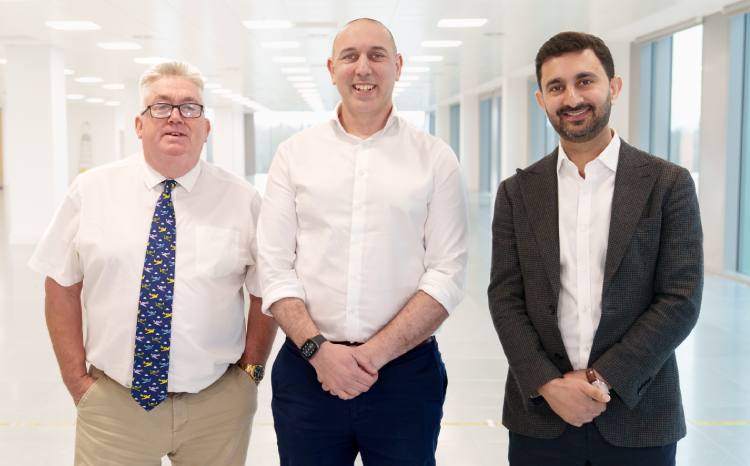Joe’s view of global domination
- 12 March 2013

As a boy, I always knew when things were going well for dad at work. He would come in singing a little song to the tune of the socialist anthem ‘The Red Flag’.
Instead of the rousing words “though cowards flinch and traitors sneer, we’ll keep the red flag flying here” he would sing in a fake posh accent “the working clarse can kiss my arse, I’ve got the foreman’s job at larst.”
This was sung with particular gusto whenever he achieved any significant promotion, and this is a tradition I have maintained.
I sang it when I passed my final exams at medical school and when I got my first consultant job. I sang it when I became national clinical lead for IT and I sang it when eHealth Insider editor Jon Hoeksma informed me I was the newly elected chair of the CCIO Leaders Network advisory group.
Sweet victory! This feeling lasted a few seconds; then, like a dog chasing a car who actually catches the car, comes a thought ‘what do you do now?’
From campaign to network
As many readers may remember, EHI ran a campaign a couple of years back to encourage NHS trusts to appoint chief clinical information officers to, as it said on the blurb, lead on IT projects and information in the health service.
The campaign was soon won – then health secretary Andrew Lansley signed up almost immediately. So to keep up momentum, EHI set up a CCIO Leaders Network to support newly appointed CCIOs and encourage more to come through.
The chair of network is an elected post. And it was nice to win, given that the caliber of the other candidates was so high and there was such an intelligent electorate. Also, with a tenure of only six months, I’m sure that everyone who wants to have a go at being chairman can have a go at it.
A new ology
So what should the CCIO Leaders Nework aim to achieve over the next six months? I’ve said here before that in my view health informatics is a new medical “ology”.
Healthcare regularly throws up a new “ology”. Different “ologies develop in different ways. Sometimes, an ology develops from a discovery like microbiology. Sometimes it develops from a specific piece of equipment, like radiology.
Very often, an ology is nurtured by a few intensely interested individuals who form a club to share ideas and developments. This goes on to find a home within a royal college and becomes a faculty. Eventually, it might become a royal college in its own right.
However, health informatics isn’t quite like any other ology because it has no natural home college. It hasn’t arisen from medicine. It is, rather, a collision of sciences and industries.
So to plan a way forward it is useful to look at the collision of computer science and another ancient profession, banking.
SWIFT to follow banking
Banking has already been transformed by its collision with computers. There was much pain along the way, but on the whole most people now take it for granted that if they put their card in an ATM anywhere in the world, their own money will come out in the local currency. It’s a daily routine miracle.
How was this miracle achieved? Well, 40 years ago an organisation called SWIFT was formed, the System for World International Financial Transactions.
SWIFT got a number of things right. Firstly, it recognised the potential that computers offered to improve efficiency. Secondly, it recognised that standards would have to be set and enforced.
Thirdly, and most importantly, it recognised that the whole exercise would require a reliable funding stream in perpetuity, because the standards would need to be continuously maintained as technology changed.
Astonishingly, the bankers agreed it was in all their interests to invest in standards, to pay annual dues to SWIFT, and to agree to be bound the standards it set. Quite an achievement in a democratic setting.
Now, we are nowhere near the agreement of an authoritative body to set standards for health IT as two industries collide. Tare glimmers of hope, but they shine from different parts of the sky.
United front
When I survey the scene, I am, not for the first time, reminded of the Peoples Front of Judea versus the Judean Peoples Front in Monty Python’s Life of Brian.
Sitting in different parts of the stadium we have BCS Health, UKCHIP, The Academy, The Royal Medical Colleges, CCIOs, the NHS Commissioning Board, the Department of Health, HIMSS, EHI and other media outlets; all trying to do the same thing at the same time but frequently wasting energy in turf wars or duplicated effort.
What I hope we can achieve in the CCIO Leaders Network over the next six months is a healthy debate about how to take forward the health informatics agenda to maximise gain for patients. To this end I am setting some clear, limited goals for the next half year.
1) Grow the network. Every trust in the UK to be represented by a lead clinician if not a properly (as yet) funded CCIO
2) Contribute to the development of a vision for the development of clinical informatics
3) Develop a business model with all stakeholders for the development of a funded standard-setting organisation for health IT, including clinical and technical standards
4) Re-write the terms of reference for the CCIO Leaders Network so that my successor gets a decent chance to make an impact – let’s say two years?
Pick a side
I would suggest that the standard setting body should be independent of the government because governments change and budgets get cut, rendering any government authority impermanent.
We have a start with the launch of the Professional Records Standards Board on 1 April as a not for profit public interest company.
However, it will only set clinical standards. Eventually, will need an overarching body like SWIFT to agree clinical and technical standards.
The Royal College of Informatics? The E-Health Institute? The CCIO Global Domination Corporation? It’s make your mind up time. If we get it right, we get to set the standards for the world and dominate the industry for years to come. If we continue in our tribes we get to pick up the pieces left by the USA.
Given recent announcements, I would also hope that CCIOs could discourage the setting of crazy top-down deadlines.
Neither health secretary Jeremy Hunt nor NHS CB national director of patients and information Tim Kelsey were close enough to the National Programme for IT in the NHS to see the fatal damage done by top down targets; but, worryingly, they are beginning to make similar noises to their predecessors.
If you are a CCIO, thinking about being a CCIO, or just that clinician bloke who is interested in a better electronic patient record join us.
The Chief Clinical Information Officers Leaders Network: the independent voice for clinicians in health informatics. If there’s enough of us, we might get listened to; so tell your friends.


Joe McDonald
Joe McDonald is a practising NHS consultant psychiatrist. Over the past five years he has been an NHS trust medical director and national clinical lead for IT at NHS Connecting for Health – a stint that included 18 months as medical director of the Lorenzo delivery team!
His experiences in the National Programme for IT in the NHS have left him with a passion for usability and "end user knowledge networks.” He is the founding chairman of the National Mental Health Informatics Network. Motto: we don’t get fooled again. Follow him on twitter @CompareSoftware




